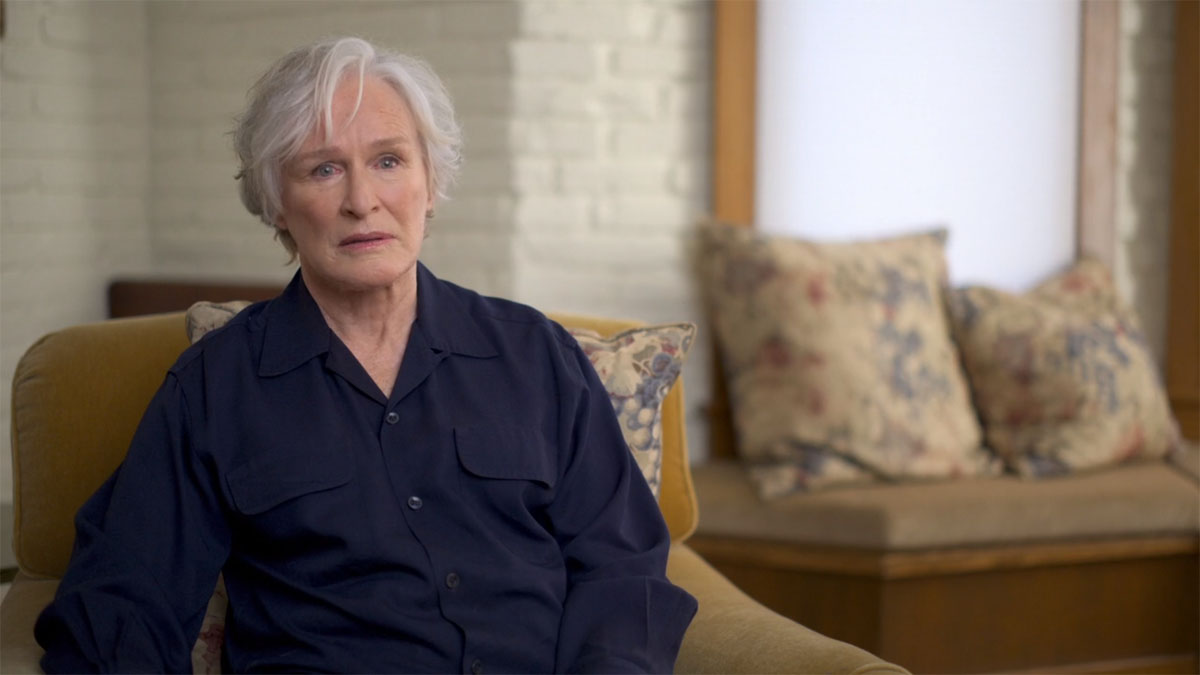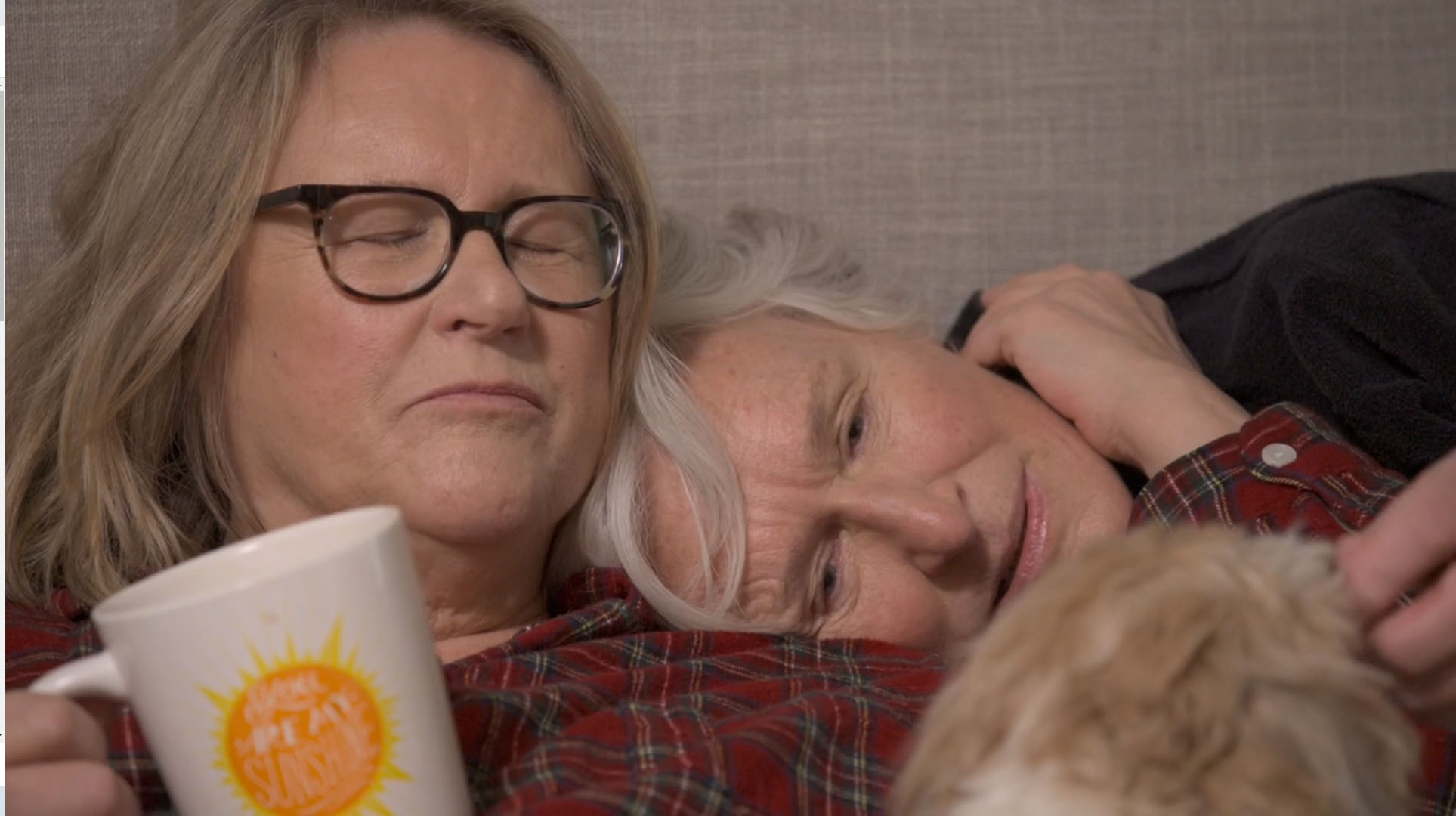
Oprah and Prince Harry’s The Me You Can’t See docuseries dropped on Thursday evening Glenn Close, who has been opening up more this past week about the mental health struggles of her family, was one of the celebrities who were interview for the series. In TMYCS, Glenn says the fourteen years that she spent growing up in the religious cult, MRA, was mostly responsible for her mental health struggles including her failed marriages. Glenn’s sister, Jessie, also was a part of the series. Jessie spoke at length about her bipolar disorder diagnosis as well as her son’s schizophrenia diagnosis. Glenn goes on to say that millions of families are struggling with mental health challenges. Below are a few more highlights via Entertainment Tonight:
MRA is founded on the idea of the “Four Absolutes” — absolute honesty, purity, unselfishness and love — and being raised under those extreme beliefs left her family “broken up,” Close says. As an adult, she reasons that that trauma has contributed to the dissolution of her three marriages.
“Because of the devastation, emotional and psychological of the cult, I have not been successful in my relationships and finding a permanent partner and I am sorry about that,” she says. “I think it is our natural state to be connected like that. I don’t think you ever change your trigger points, but at least you can be aware of them and maybe avoid situations that might make you vulnerable, especially in relationships.”
The episode continues with frank discussion of mental illness within the Close family, including Jessie’s hospitalization for and subsequent diagnosis with bipolar 1 disorder and her eldest son, Calen Pick, being diagnosed as schizophrenic.
Close remembers the moment her sister reached out for help. “We all happened to be in my parents’ house in Wyoming, and I remember her kids were already loaded in her car and she came up to me across the driveway and said, ‘I need help. I can’t stop thinking about killing myself.’ For me, it was a shock. She ended up in McLean Hospital — a psychiatric hospital in Massachusetts — I took her there. She was finally, at age 50, properly diagnosed as bipolar 1 with psychotic tendencies,” Close says, growing emotional as she shares, “Jessie told me she was afraid that if parents found out that she had bipolar 1 that they wouldn’t allow their children to play with her daughter.”
With a dearth of mental health experts in their hometown of Bozeman, the Close sisters are now working to bring a psychiatric ward to their local hospital. “This issue, if it’s in our family and if we’re dealing with this kind of pain and this kind of fright and this kind of sense of shame, there are millions of other families who are going through the same thing,” Close says.
I was up until 4 am Friday morning watching the first three episodes of The Me You Can’t See and it was absolutely heartbreaking. I appreciated how the series focused on how people’s childhood traumas affect them as adults. As someone who had a lot of childhood traumas I felt seen. Glenn’s story about growing up in a cult was shocking. I hope one day she will be able to heal. Like Glenn said, it is natural to want to share yourself with someone else. Listening to Glenn and her sister talk about their struggles and seeing how close they were was also heartwarming for me because mental illness can often tear a family apart. My uncle had a combination diagnosis of bipolar and schizophrenia and it was very difficult to be with him when he was having one of his episodes. We loved him though AND it hurt to see him struggle the way that he did (he often wouldn’t take his meds).
Mental health needs to be less taboo and I am happy that celebrities are talking about it. Glenn, Oprah, Lady Gaga and Harry are helping others feel less shame. When we talk about what is ailing us we take steps toward healing and feel less alone.












I didn’t know Glenn Close grew up in that cult. I’ve never heard of it but it sounds like a burden. She actually went to the same high school I did, though she went to the girl’s school before it eventually merged with it’s “brother school” and they combined their names. I went when it was co-ed. She attended an alumni event of some kind and I met her, because she had done theater and music at school and I was involved with it. It was years ago and very brief. She seemed lovely. How awful for her and her family.
Glenn is a treasure. I watched the entire “The You Can’t See” twice. It was excellent. So much compassion for these people. I have a new respect for some of them.
I do wish they would have covered being the family scapegoat – so many of us have gone through it and still do to this day.
I’ve only gotten through the first episode so far. It’s very emotionally draining in my opinion, but also very compelling, so I am going to watch the whole thing, but it’s going to take me longer than I had anticipated.
I’m glad Glenn was able to get help for her sister and I’m glad that they are working to bring a psych ward to their hometown hospital. The more access everyone has to help, the better we are as a society IMO.
I saw this great comment that said, “ I wish I had understood my depression better and gotten help for it earlier. I felt like part of my life was a bit wasted”.
For those who haven’t watched it yet, I found Lady Gaga’s (Stefani) the most powerful and cathartic. It was so raw and so genuine. All those times when she was acting out, and disappeared for a time, she describes what was really going on and why.
Robin Williams’ son Zak was powerful too. They all were in their own way. There was such a cross-section of the global society. They really tried to be diverse in their coverage. I hope there will be more segments, covering more types of issues.
As for destigmatizing mental health issues, I think progress will continue to be very, very slow, but at least it’s some progress. People just do not want to admit weakness. My own family is so proud and arrogant, they would never admit issues – to them, that would be weakness.
I see so many parallels in the royal family with my own family. I relate to Harry being the scapegoat because my family made me my generation’s scapegoat. One of my paternal aunts was the older generation’s scapegoat. One of my paternal great-uncles was that generation’s scapegoat.
I was determined that my children would not have to deal with that but I can see them trying to do it to my son. Fortunately he’s about as “Eff You” as one can get and I’m proud of him for that. He still hurts, though.
I loved the way the sisters loved each other.
It was the antithesis of Harry’s story.
It REALLY is. Both are so heartbreaking.
This sounds amazing. That’s amazing that Close, her family, and others on the show are being so open and generous with sharing their traumas. I hope it’s a positive experience for them. I’ll have to watch the show.
Mental health is in the media a lot more but I’m not sure people are ready for the ugly side of it. Obviously it’s good to talk but in the main attractive together representations of anxiety or depression don’t necessarily help the more severe mental health conditions or those at the top end of the anxiety/depressive scale.
Most of the time those in society with the worst mental health conditions don’t present in the accepted way ie. it’s the drunk looking obnoxious homeless man who’s screaming obscenities and smells of urine. He is the most deserving of compassion but is likely to be shunned.
Equally I had a severe mental breakdown (I’m bipolar 1) but my boss couldn’t recognise that at my most manic I was the most unwell and needed immediate help because my productivity was through the roof. I had to explain that mental illness doesn’t always show itself as rocking in the corner hugging your knees. I was the best employee ever until it got too much I hit the peak end and jumped off a bridge.
So important for people and beyond helpful personally knowing I’m not alone in these struggles.
This is such a groundbreaking documentary. To see these famous, wealthy, elite figures struggle with the most basic aspects of emotional life will definitely help destigmatize mental health. I have struggled in adult relationships because of my childhood. I cannot watch Oprah’s episode, it is too triggering for me. But I will watch the others.
It does help seeing others go through it, and inspires me to fight through it. Unfortunately, mental health help is not accessible right now, save for the very wealthy.
Glenn’s story was heartbreaking. I’ve been watching my BFF’s family go through a lot of these family struggles. She’s battling a physical illness (cancer) while her sister is battling a mental one (bipolar-schizophrenia). It’s tragic to see their mom treat them so differently. She just doesn’t understand.
Is there a way to watch if you don’t have Apple plus?